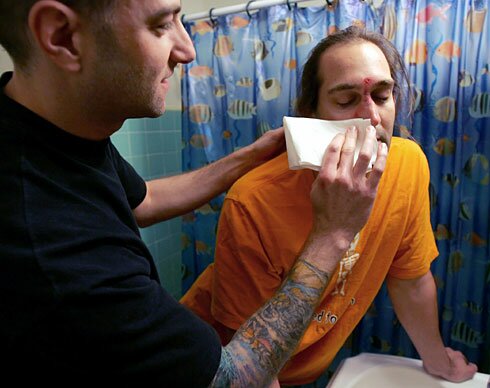Mon 29 May 2006

Roger Tinkoff, left, tends to Nick Sanders’ cut after a fight at the Gentleman’s Fighting Club. (Jeff Chiu, AP)
MENLO PARK, Calif. (AP) — They may sport love handles and Ivy League degrees, but every two weeks some Silicon Valley techies turn into vicious street brawlers in a real-life, underground fight club.
Kicking, punching and swinging every household object imaginable — from frying pans and tennis rackets to pillowcases stuffed with soda cans — they beat each other mercilessly in a garage in this bedroom community south of San Francisco.
Then, bloodied and bruised, they limp back to their desks in the morning.
“When you get beat down enough, it becomes a very un-macho thing,” said Shiyin Siou, 34, a Santa Clara software engineer and three-year veteran of the clandestine fights. “But I don’t need this to prove I’m macho — I’m macho enough as it is.”
Inspired by the 1999 film Fight Club, starring Brad Pitt and Ed Norton, underground bare-knuckle brawling clubs have sprung up across the country as a way for desk jockeys and disgruntled youths to vent their frustrations and prove themselves.
“This is as close as you can get to a real fight, even though I’ve never been in one,” the soft-spoken Siou said.
Despite his reserved demeanor, he daydreams about inflicting pain on an attacker. “I have fantasies about it,” he said.
In recent months, police in New Jersey and Pennsylvania have broken up fight clubs involving teens and preteens who posted videos of their bloody battles online.
Earlier this month in Arlington, Texas, a high school student who didn’t want to participate was beaten so badly that he suffered a brain hemorrhage and broken vertebrae. Six teenagers were arrested after DVDs of the fight appeared for sale online.
Adult groups are more likely to fly under the radar of authorities.
Menlo Park police hadn’t heard about the local club and said they wouldn’t be likely to take action because the fights are on private property between consenting adults. That could change if someone complains or is sent to a hospital, police said.
Gints Klimanis, a 37-year-old software engineer and martial arts instructor, started the invitation-only “Gentlemen’s Fight Club” in Menlo Park in 2000 after his no-holds-barred sessions with a training partner grew to more than a dozen people. Most participants are men working in the high-tech industry.
“You get to be a superhero for a night,” Klimanis said. “We have to go to work every day. We’re constantly told to buy things we don’t need, and just for a couple hours we have the freedom to do what we want to do.”
The only protective equipment used is fencing and hockey masks. Several fighters have suffered broken noses, ribs and fingers.
Men involved in fight clubs often carry bottled-up violent impulses learned in childhood from video games, cartoons and movies, said Michael Messner, a University of Southern California sociology and gender studies professor.
“Boys have these warrior fantasies picked up from popular culture, and schools sort of force that out of them,” he said. In these fantasies, “The good guys always resort to violence, and they always get the glory and the women.”
There is also a sadomasochistic thread running through underground fight clubs, said Michael Kimmel, a sociology professor at Stony Brook University in New York.
“Real-life fight clubs are the male version of the girls who cut themselves,” he said. “All day long these guys think they’re the captains of the universe, technical wizards. They’re brilliant but empty.
“They want to feel differently. They want to get hit, they want to feel something real.”
Five-year fight club veteran Dinesh Prasad, 32, a heavily tattooed Santa Clara engineer, said he once broke a rib in a match but never complained to his fellow combatants. He also recently skipped his first wedding anniversary to attend a fight rather than drive to Los Angeles, where his wife is finishing law school.
“I came here to get over my fear of fighting, and it’s working,” he said. “I’m much tougher than I was five years ago. I’m not at the level of these other guys, but if things were to get tough, I can get tough, too.”
Copyright 2006 The Associated Press. All rights reserved. This material may not be published, broadcast, rewritten or redistributed.